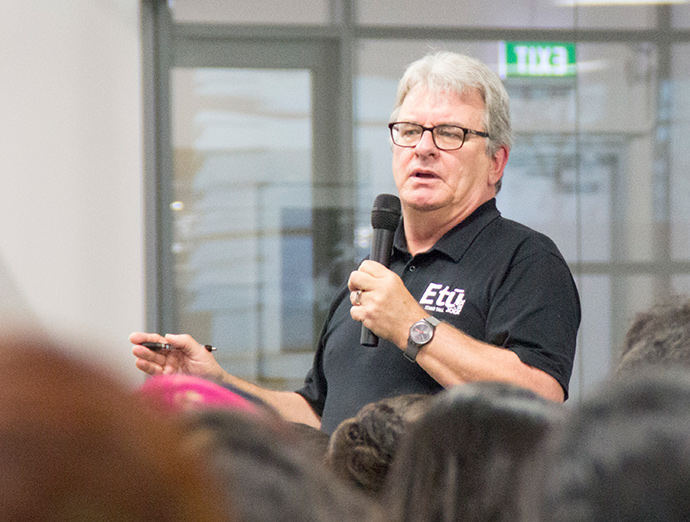
It was a huge undertaking, but E tū members did it!
Together with our member leaders, your union met with thousands of care and support workers to ratify the equal pay settlement. The meetings resulted in almost 2000 new members joining our union – a fantastic result.
A huge thank you must go to our army of member leaders, among them, Wairarapa delegate Simone O’Connor.
“They were great meetings,” says Simone. “It was such a terrific atmosphere!
“Everyone was so positive and pleased and talking about what they could do with the money, like going on holiday, visiting the dentist, or upgrading the car – things they couldn’t think about before. It was very special. I was sad when they were over!”
Meanwhile, our members are still getting used to the difference the settlement makes to their pay.
Auckland carer, Lumanai Penesa, says when she saw her first full fortnightly pay slip after 1 July, she could hardly believe the figure was correct.
“It came as a big surprise to me,” says Lumanai who works at Gracedale Care Home.
“It’s a lot. After all these years of being underpaid, we made it and we won! It’s great news for me. It’s peace of mind.”
Lumanai is now looking forward to her first family holiday in years.
“Me and my family, we never travel out of Auckland. Now I’m making plans. I’m always driving these old, old cars. Now, I’m going to buy a good car so I can take my family away at Christmas time and during holidays, just explore the rest of New Zealand.”
Lumanai says the new pay has also transformed how she feels about her job: “It makes us want to come to work, knowing you can bring home good money. It just helps us with a lot of things.”

Sealed with a kiss – Lumanai Penesa’s first full Equal Pay slip
Equal pay urgent for mental health workers
Hamilton-based mental health support worker, Nellie Katipa, can’t afford a phone or email.
“I need the power on, so I’d rather pay for that,” says Nellie, who earns about $500 a week after tax for 35 hours work – rostered over just three days.
“I don’t think I should be working these long hours,” she says. “I wouldn’t need to if our employers could fund equal pay.”
Nellie is among the mental health support workers who lodged an equal pay claim with the Employment Relations Authority in June.
Nellie says mental health workers earn too little and they are now working longer hours and more shifts than ever as their co-workers move to better paid care and support jobs covered by the equal pay settlement.
“It’s marvellous what’s happened to them but it’s just not fair,” says Nellie. “Our bosses can’t attract replacement staff and we are working longer hours.”
DHBs started paying some mental health employers extra money to keep and attract staff, but the Ministry of Health has told them to stop, despite the escalating staffing crisis.
A former Christchurch mental health worker, who can’t be named due to contractual issues, says the situation means some providers are no longer accepting additional mental health clients.
“The mental health staff are dropping away, so what happens to providers when they have no one to run their houses?”
She warns this will mean more admissions to already overflowing hospitals.
E tū is urging the Government to deal with the crisis by funding equal pay for community mental health workers.
Equal pay campaign targets pay equity bill
Equal pay campaigners have targeted the Government’s equal pay bill, saying it puts too many hurdles in the way of pay equity for women.
Last month, your union joined other equal pay supporters to rally against the bill with both Labour and the Greens committing to the bill’s withdrawal and replacement if they are elected into Government.
For mental health support workers, the bill would nullify their pay equity case and they’d have to start from scratch.
“It will make it tougher for us,” says Auckland mental health support worker, Sandra Rawenata, who spoke at last month’s equal pay rally in Auckland.
“It means a lot more work, a lot more campaigning and another five-year process before we ever see equal pay,” says Sandra.
“We wouldn’t have achieved the care and support equal pay settlement under this bill, so we want it withdrawn,” says Marianne Bishop, E tū Women’s Committee Convenor.
Marianne says members need to send this message to their MPs.
“Go and talk to them. They vote on this – we need to let people know that we, as workers, don’t agree with it.”

Mental health worker, Sandra Rawenata at last month’s Equal Pay rally




